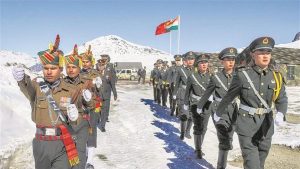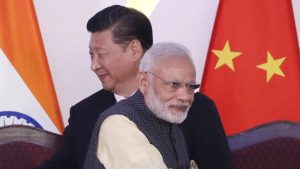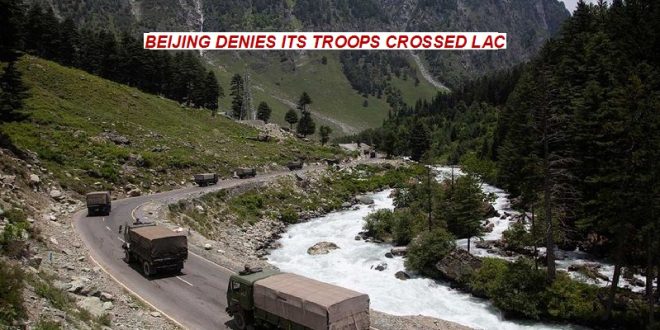31-08-2020
By SJA Jafri + Agencies
NEW DELHI/ BEIJING/ ISLAMABAD: China has carried out “provocative military movements” in the Himalayan border area disputed between the two countries overnight from Saturday to Sunday, according to an Indian army statement, in a fresh flare-up between the two nuclear-armed countries.
 Indian troops pre-empted Chinese army’s activity on the Pangong Tso Lake in Ladakh, part of which was transgressed by the Chinese soldiers in May, the statement said on Monday, adding that Indian troops took steps to thwart the Chinese attempt to “unilaterally change” facts on the ground.
Indian troops pre-empted Chinese army’s activity on the Pangong Tso Lake in Ladakh, part of which was transgressed by the Chinese soldiers in May, the statement said on Monday, adding that Indian troops took steps to thwart the Chinese attempt to “unilaterally change” facts on the ground.
“On the Night of 29/30 August 2020, PLA [People’s Liberation Army] troops violated the previous consensus arrived at during military and diplomatic engagements during the ongoing standoff in Eastern Ladakh and carried out provocative military movements to change the status quo,” the Indian army said in a statement.
“Indian troops pre-empted this PLA activity on the southern bank of Pangong Tso Lake, undertook measures to strengthen our positions and thwart Chinese intentions to unilaterally change facts on ground,” it said.
Army officials from the two sides are meeting to resolve the latest border dispute that comes more than two months after 20 Indian soldiers were killed in fighting that broke out between the two sides in Ladakh’s Galwan Valley.
 “Talks have been going on between the two sides since May to resolve these escalating tensions but despite these talks going on there was a very violent clash on the 15th of June, where 20 Indian soldiers and an unknown number of Chinese soldiers were killed,” A journalist reporting from New Delhi, said.
“Talks have been going on between the two sides since May to resolve these escalating tensions but despite these talks going on there was a very violent clash on the 15th of June, where 20 Indian soldiers and an unknown number of Chinese soldiers were killed,” A journalist reporting from New Delhi, said.
“Since then these talks between the two sides have really ramped up and yet the latest statement from the Indian army indicates that they were still far from a solution to this.”
Meanwhile, China’s Foreign Ministry dismissed the allegations made by India. Chinese border troops “always strictly abide by the Line of Actual Control (LAC), and never cross the line”, spokesman Zhao Lijian told a news briefing, referring to the the de facto frontier between the two countries.
Both sides are in communication regarding the situation on the ground, he said.
The two Asian giants have held several rounds of military and diplomatic talks to resolve the border dispute that erupted in late April after Chinese troops transgressed into the Indian side of the LAC.
 For months, troops have been locked in a face-off in the western Himalayas, where each side accuses the other of violating their nearly 3,500km-long (2,000 miles) border, most of which remains un-demarcated.
For months, troops have been locked in a face-off in the western Himalayas, where each side accuses the other of violating their nearly 3,500km-long (2,000 miles) border, most of which remains un-demarcated.
The recent border tensions are the most serious in more than half a century.
Accusing each other of instigating the violence, both sides pledged to safeguard their territory but also to try to end the standoff that dramatically changed India-China bilateral relationship.
India has banned dozens of Chinese apps, including widely popular video-sharing app TikTok, and has placed restrictions on Chinese investments amid backlash against Beijing following the deadly border clashes.
India’s Foreign Minister Subrahmanyam Jaishankar has termed the latest border stand-off as “the most serious situation after 1962” war with China.
“This is surely the most serious situation after 1962. In fact, after 45 years, we have had military casualties on this border. The quantum of forces currently deployed by both sides at the LAC is also unprecedented,” Jaishankar told  Rediff.com in an interview last week.
Rediff.com in an interview last week.
India and China fought a war in 1962 over their competing territorial claims, and the two Asian giants have been unable to agree a permanent border along their frontier.
The ongoing standoff high in the Karakoram Mountains is over disputed portions of a pristine landscape that boasts the world’s highest landing strip, a glacier that feeds one of the largest irrigation systems in the world, and a critical link to China’s massive “Belt and Road” infrastructure project.
The faceoff began at three places in April, but by June it escalated and spread to two other places toward the north in Depsang and Galwan Valley where India has built an all-weather military road along the disputed frontier.
On June 15, the situation turned deadly when the rival troops engaged in a night-time clash in Galwan that left 20 Indian soldiers dead. China did not report any casualties.
 Pressmediaofindia
Pressmediaofindia




